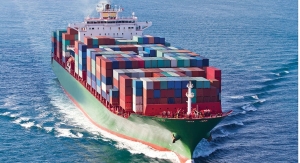10.16.15
The first ever digital tool for the shipping industry that can accurately predict the potential fuel and CO2 savings offered by fouling control coatings has been launched by AkzoNobel's Marine Coatings business.
With more than 3.5 billion data points, Intertrac Vision is the first "Big Data" solution to accurately predict the performance of a coatings technology – before it has been applied.
It works by analyzing factors such as hull roughness; the "roughness" associated with biofouling, and computational fluid dynamic studies carried out on different hull types. This vessel-specific information is then processed using proprietary algorithms to provide an accurate assessment of the impact of each potential fouling control coating choice, including a full cost-benefit analysis.
"Hull coatings play a key role in a vessel's profitability, so having an accurate understanding of the return on investment is an essential part of the decision-making process," explained Michael Hindmarsh, Project Lead for Intertrac Vision. "By offering this state-of-the-art tool, we can bring a new level of transparency and choice to the industry, working with customers to ensure that the most appropriate coatings solution is selected for each vessel within a fleet."
The advanced science that underpins Intertrac Vision has taken more than four years to develop. The work was led by AkzoNobel scientists in collaboration with leading academic and commercial research institutes, including the University College London Energy Institute, Maritime Research Institute Netherlands (MARIN), Newcastle University and more than 30 ship owners and operators.
"We are aiming to bring the industry a step closer to a new era of robust, rigorous analysis which can help improve the rationality in hull coating selection," added Tristan Smith, lecturer at the University College London Energy Institute and one of several academic contributors to Intertrac Vision. "This should enable ship owners to make more informed decisions, based on the key variables that influence the performance of fouling control coatings on their vessels."
Commenting on the launch, Oscar Wezenbeek, Managing Director of AkzoNobel's Marine Coatings business, said: "Intertrac Vision is a pioneering digital solution which helps customers make more informed choices. The combination of a solid theoretical understanding and an ever-growing database of real vessel performance data enables us to predict comparative performance. The fact that only AkzoNobel offers all fouling control technologies allows us, with the support of Intertrac Vision, to be truly objective in informing our customers."
With more than 3.5 billion data points, Intertrac Vision is the first "Big Data" solution to accurately predict the performance of a coatings technology – before it has been applied.
It works by analyzing factors such as hull roughness; the "roughness" associated with biofouling, and computational fluid dynamic studies carried out on different hull types. This vessel-specific information is then processed using proprietary algorithms to provide an accurate assessment of the impact of each potential fouling control coating choice, including a full cost-benefit analysis.
"Hull coatings play a key role in a vessel's profitability, so having an accurate understanding of the return on investment is an essential part of the decision-making process," explained Michael Hindmarsh, Project Lead for Intertrac Vision. "By offering this state-of-the-art tool, we can bring a new level of transparency and choice to the industry, working with customers to ensure that the most appropriate coatings solution is selected for each vessel within a fleet."
The advanced science that underpins Intertrac Vision has taken more than four years to develop. The work was led by AkzoNobel scientists in collaboration with leading academic and commercial research institutes, including the University College London Energy Institute, Maritime Research Institute Netherlands (MARIN), Newcastle University and more than 30 ship owners and operators.
"We are aiming to bring the industry a step closer to a new era of robust, rigorous analysis which can help improve the rationality in hull coating selection," added Tristan Smith, lecturer at the University College London Energy Institute and one of several academic contributors to Intertrac Vision. "This should enable ship owners to make more informed decisions, based on the key variables that influence the performance of fouling control coatings on their vessels."
Commenting on the launch, Oscar Wezenbeek, Managing Director of AkzoNobel's Marine Coatings business, said: "Intertrac Vision is a pioneering digital solution which helps customers make more informed choices. The combination of a solid theoretical understanding and an ever-growing database of real vessel performance data enables us to predict comparative performance. The fact that only AkzoNobel offers all fouling control technologies allows us, with the support of Intertrac Vision, to be truly objective in informing our customers."



